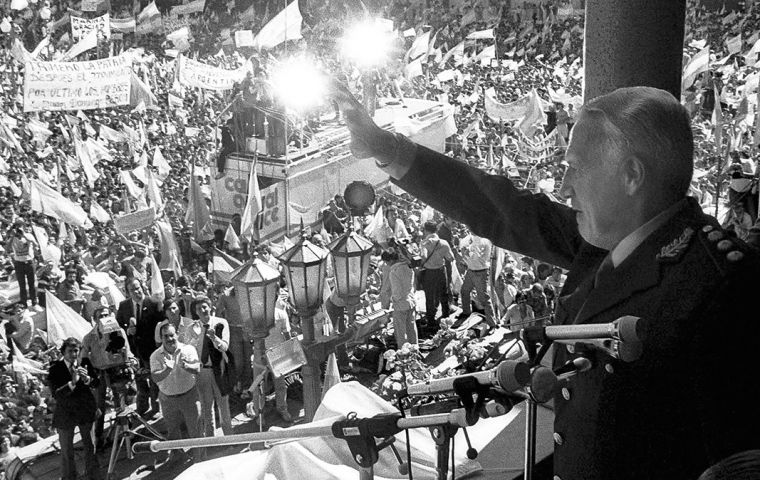MercoPress. South Atlantic News Agency
Brazil in the crossfire of the Falklands/Malvinas war
 The Brazilian report point to Galtieri, who managed a huge rally in Plaza de Mayo, “making people believe they could defeat the world's third strongest military power”
The Brazilian report point to Galtieri, who managed a huge rally in Plaza de Mayo, “making people believe they could defeat the world's third strongest military power” Brazil apparently was quite active during the Falklands War, and mounted a network to “search and collect information” on its neighbor (and historic competitor) Argentina, keeping a close eye on the military actions in the South Atlantic, and potential allies of the military Junta.
Brazil was also nearing the end of the military takeover which took place in 1964 and would be returning to democracy in 1984/85, and the military were suspicious of Argentina flirting with Russia, Cuba, Libya and other 'red' regimes.
According to O Estado de Sao Paulo, one of the leading newspapers and most influential of the country, much of the information on the Falklands war is in the country's National Archives, provided by the Chiefs of Staff from the Brazilian Armed Forces. Researchers and scholars have had access to them and there is a book to be launched in coming weeks, “Brazil and the Malvinas War: in the crossfire”
The “search and collect network”, a spying system was set up since Argentina under the military was submitted to a very strict censorship and only official information was published. Besides Argentine military were reticent to share with their Brazilian counterparts any details.
The documents at the Brazilian archives to which scholars and journalists from Brazil and Argentina had access showed certain surprise almost apprehension since the Argentine Junta had managed a degree of legitimacy by defeating terrorism and with the recovery of the Malvinas, following the invasion of the Islands.
Apparently Brazil helped Argentina with arms and intelligence but was also cautious in keeping a good relation with London.
However among the documents is a report from a Brazilian Air Force attaché pointing out that on 26 March 1982, the three members of the Argentine Junta, General Leopoldo Galtieri, Admiral Jorge Isacc Anaya and Brigadier Basilio Lami Dozo plus foreign minister Nicanor Costa Méndez held a 'state secret' meeting where the decision to invade the Malvinas Islands was decided. And, “not even the top officers of the Joint Command were aware”, and the report adds, “a fact that proved to be 'negative'”.
The Brazilian report point to Galtieri as head of the invasion operation, and fears about his future, despite the fact he managed a huge rally in Plaza de Mayo, “making people believe they could defeat the world's third strongest military power”
Brazil was aware that the invasion and recovery of the Malvinas had been planned for May or June, “when weather conditions would be even more adverse for the British”, but on 2nd April 1982, Operation Rosario was announced and launched.
“Argentina's collaboration in combating left wing guerrillas in Central America, made the Junta believe the US government would force a diplomatic solution to the dispute, and the English reaction was underestimated,” adds the Brazilian report sent from Buenos Aires.
One of the Brazilian researchers, Joao Roberto Martins Filho, professor at the Sao Carlos Federal University and who is preparing the book to be launched next month (“Brazil and the Malvinas War: in the crossfire”), also had access to the Itamaraty archives (Brazilian foreign ministry) and British archives.
He also details that the Brazilians had managed to decipher the encrypted messages code from the Argentine foreign ministry.
Professor Martins Filho reveals that Brazilians were most concerned about Soviet and Cuban military aid and the missiles promised by Libya's Gaddafi, SAM-6 and SAM-7 which allegedly were delivered in five Boeing 707 Aerolineas Argentinas flights.
But Brazil's main concern was the Argentine nuclear program. In effect Argentina and the Soviets had negotiated the sale of a hundred kilos of enriched uranium, and Brazilians also feared Soviet bases in Argentina.
But one of the big catches of Brazilian intelligence was a US made AGM-45 Shake missile, discovered in “a Vulcan bomber that landed in Rio do Janeiro on a return flight from the Malvinas” Brazil agreed to liberate the Vulcan bomber but retained the missile. UK and US put pressure to recover the missile which apparently had a state of the art guiding system, and they did not want Brazil to sniff into it.
Although Brazil insisted in taking advantage to examine the missile, thinking of copying its targeting system, it was finally returned to UK, secretly, once the war was over following the Argentine surrender. Summing up Brazil managed to set up 'a network of search and collect information', while at the same time keeping good relations with the UK during the conflict.
Likewise during the war many of the main Brazilian media referred to the Islands as Falklands, and in some editorials strongly questioned the issue of using force to recover territory, fearing it could trigger a succession of territorial conflicts in the continent. Brazil has borders with all South American countries except Chile and Ecuador, and with all of them has pending border disputes.




Top Comments
Disclaimer & comment rulesCommenting for this story is now closed.
If you have a Facebook account, become a fan and comment on our Facebook Page!